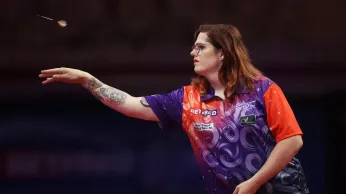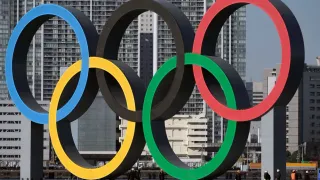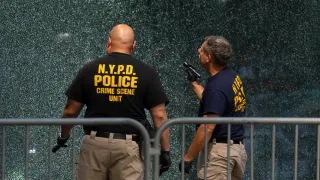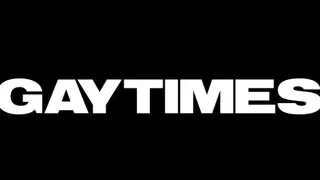
Jul 29
Protesters Removed After Confronting Trans Darts Player Noa-Lynn van Leuven at World Matchplay
READ TIME: 3 MIN.
Security at the iconic Winter Gardens venue in Blackpool, England, forcibly removed several gender-critical protesters on Sunday, July 21, 2025, after they confronted transgender darts player Noa-Lynn van Leuven during the Women’s World Matchplay event. The demonstration, which occurred just before van Leuven’s opening match, involved three women standing in the audience, one holding a sign reading “He’s a man,” and others wearing shirts with slogans such as “Save women’s sport” and “Sex Matters” .
The protest was led by Jean Hatchet, a writer and vocal advocate for restricting women’s sports to cisgender women. Security personnel responded promptly, escorting Hatchet and at least two other women from the venue. Video posted to social media by Hatchet appears to show security officers physically removing the group, with Hatchet later posting images of bruises and claiming she was “grabbed hard” despite offering to leave peacefully .
Hatchet’s protest and subsequent removal were widely discussed online, garnering both support and criticism.
Noa-Lynn van Leuven, a 28-year-old player from the Netherlands, is the first openly transgender woman to compete at the highest levels of professional darts. Her participation has made headlines since her debut, and she has faced both significant backlash and enthusiastic support from fans, fellow players, and organizations . Van Leuven completed her gender transition in 2022. Since then, she has become a visible figure in the sporting world, navigating both the challenges and opportunities that come with increased media attention.
Despite the protest, van Leuven performed strongly in her opening match, defeating Lorraine Winstanley in a best-of-seven-legs fixture before being narrowly defeated 5-4 by Fallon Sherrock in the following round . The Professional Darts Corporation (PDC), which organizes the tournament, has publicly affirmed its support for transgender athletes competing in accordance with its eligibility policies .
The incident has prompted a wave of responses. Many LGBTQ+ advocates and allies within the darts community have condemned the protest as disruptive and discriminatory, emphasizing the importance of inclusion in sports. Van Leuven, while declining to comment directly on the protest, has previously spoken about the difficulties of being targeted for her identity, stating that she hopes to serve as a role model and to focus on her performance rather than controversy .
Prominent LGBTQ+ organizations have reiterated their support for transgender athletes, noting that visibility and representation are critical for challenging stigma and fostering acceptance. The protest, while distressing for those targeted, has also highlighted the resilience of transgender competitors and the importance of upholding safe and welcoming environments at sporting events .
On social media, reactions were polarized, with some expressing sympathy for the protesters’ cause and others denouncing the disruption and affirming van Leuven’s right to compete. The episode is the latest in a series of debates that have played out in both online and offline arenas regarding transgender inclusion in sports.
The events at Blackpool reflect ongoing international debates about the eligibility of transgender athletes in women’s sports. Policies vary widely across sporting federations, with some organizations adopting gender identity-based eligibility criteria and others imposing restrictions based on hormone levels or requiring athletes to compete in their assigned sex at birth.
The PDC’s policy allows transgender women to compete in women’s events if they meet specific requirements, aligning with a growing number of sporting bodies that seek to balance inclusion with perceived competitive fairness . The debate remains contentious, with advocates for transgender inclusion emphasizing the need for sporting opportunities free from discrimination, and opponents arguing for tighter restrictions.
In the aftermath of the Blackpool protest, discussions about security protocols, protest rights, and athlete safety have intensified. Event organizers have reaffirmed their commitment to ensuring that all athletes, including transgender competitors, can participate without fear of harassment or intimidation .
As the darts world moves forward, the visibility of players like Noa-Lynn van Leuven continues to fuel conversations not just about sport, but about the broader values of equity and inclusion. For many in the LGBTQ+ community, her presence on the world stage is a testament to perseverance and the ongoing struggle for acceptance in all arenas of public life.






